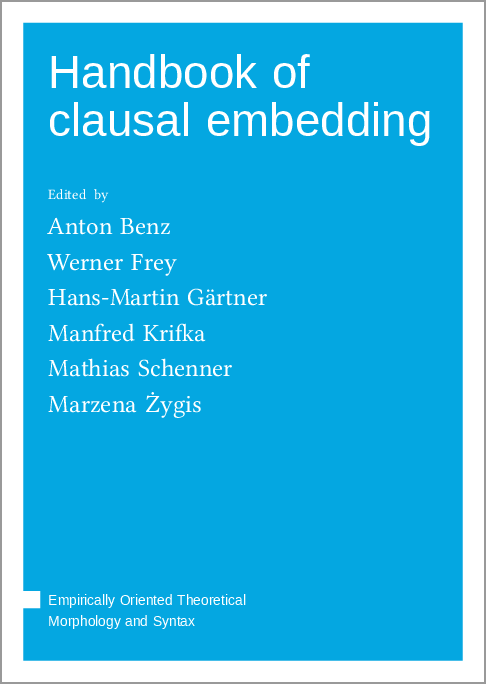We log anonymous usage statistics. Please read the privacy information for details.
Forthcoming: Handbook of clausal embedding
Synopsis
The fact that we can embed one clause within another, as in this very sentence, is a curious property of human language. On the one hand, clauses express complete thoughts and can be used to perform separate speech acts; on the other, they can be constituents of such thoughts and contribute to their formation. In this way, they are the prime example of recursivity, which is discussed as one of the distinctive features of the human language faculty.
This Handbook of Clausal Embedding aims to introduce and familiarize readers with current research on clausal subordination. It attempts to cover all aspects of embedding configurations -- their formal syntactic and morphological markings, their effects on prosody, their semantics, their pragmatics as well as their relation to discourse phenomena. It also discusses clausal embedding in language acquisition and its importance for our understanding of the mind of others, exploring, moreover, its diachronic development and realization across a broad spectrum of linguistic systems. In this, the topic of clausal embedding is relevant for many subdisciplines of linguistics, and it is important for all linguistic frameworks. We as editors, and our authors, have tried to concentrate on the central aspects of their respective subtopics, and make them accessible to students and researchers in linguistics and adjacent fields, like, among others, psycholinguistics and cognitive science. We thought it prudent to have a rather comprehensive notion of clausal embedding that encompasses what might be considered borderline cases. We understand clausal embedding as comprising configurations in which one or more clauses, or expressions that have clause-like denotations like infinitive constructions or deverbal nominalizations, are hosted within another clause or expression with a clause-like denotation. This covers argument clauses, adjunct clauses, and relative clauses. We included coordinated clauses and parenthetical clauses, as they also may constitute parts of larger clauses. Furthermore, we discussed the presence of embedding within discourse, which further contributes to our understanding of the intricate and overarching nature of clausal organization within language. This handbook has a long gestation time. The plan originated from the research program of the Zentrum für Allgemeine Sprachwissenschaft, ZAS. Before ZAS became a member institution of the Leibniz Association in 2017, it received funding for research on Embedding, linking and constituent boundaries in spoken language, grammar and discourse, starting in 2008 and funded by the Federal Ministry of Education and Research, Germany and the Senate of Berlin. The research interest on the role of clauses in communication, and their embedding, continued with the project SPAGAD: Speech Acts in Language and Discourse, funded under the European Union's Horizon 2020 research and innovation programme under agreement No 787929. We thank these institutions for their financial support.
Chapters
-
Introduction
-
Argument clauses
-
Adverbial clauses
-
Relative clauses
-
Coordination
-
Parenthetical clauses
-
Typology of argument clauses
-
The typology of relative and adverbial clauses
-
Nominalised clauses
-
Subordinating in sign languages
-
The diachrony of embedding
-
Prosody and syntax of argument and adverbial clauses
-
The syntax-prosody mapping of coordinated clauses, relative clauses, parentheticals and left-dislocations
-
Compositional semantics of embedding
-
Embedded speech acts and implicature
-
Reporting with clausal embedding and without
-
Projective contentPresuppositions and conventional implicatures
-
Embedding in discourse
-
Processing embedded clauses
-
Embedding of adverbial and relative clauses in acquisition
-
Theory of mind and clausal embedding



